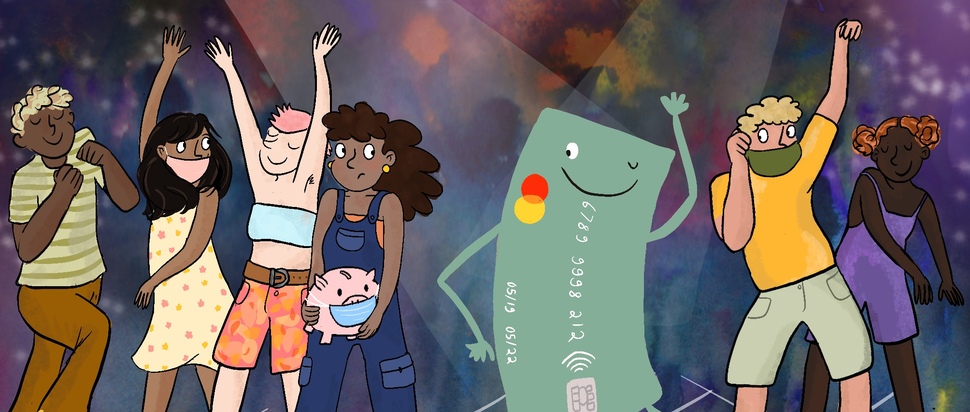How lockdown has created more money worries for young people
As restrictions lift and life starts going back to some normality, we speak to young people about how spending the last year-and-a-bit in lockdown has changed their attitudes towards money
A double vodka Diet Coke is significantly more expensive when you’re not pouring it in your own bedroom, pre-drinking for the night’s Zoom hang. Ubers add up. Brunch isn’t cheap. Young people are re-learning all this now that we’re living a semi-normal life for the first time in a year and a half.
It’s an odd pairing: the world is reopening yet somehow it feels like the beginning of the end. A ‘fuck it’ attitude takes hold – we’ve just survived a pandemic after all – but that attitude gets increasingly expensive when the world continues to stay open. It’s not as if the pandemic years have been financially easy. Calls for rent controls were answered with rent increases – by an average of £73 a month in Glasgow, according to ECA International. Government funding has been cut for just about everything. Plenty of workers were denied furlough, and instead were put on unpaid leave or simply made unemployed. Now, many young people are finding themselves on Universal Credit, amid panic-masters degrees, or moving back to the family home.
For Hamilton-based Laura*, 23, the pandemic marked the beginning of “almost intrusive thoughts” about money. These thoughts focused on financial security: “Why didn’t I save enough money for this, or why haven’t I started saving, or why don’t I know about saving money.” Laura’s emphasis on “I” is normal: we tend to blame ourselves for our financial concerns. In a country where money is one of many topics considered impolite dinner conversation, it’s unsurprising that we’re all a little financially incompetent. But we’re putting the weight of this responsibility on our already weary shoulders, amid a pandemic that has been catastrophically mismanaged by a Tory government.
However, lockdown marked almost the reverse for Hannah*, 20, from Glasgow. “Lockdown has helped me get into saving,” says Hannah. She’s aware she says this from a place of privilege. For many, the pandemic brought serious financial fears from the offset and, for many more, financial fears are part of daily life, pandemic times or otherwise.
But, no matter the privilege behind your pandemic, everyone was looking for ways to cope as life changed forever. For many young people, that meant overspending. With not much of a social life during lockdown, Hannah started saving, but she isn’t shy to admit that she also started overspending on things she didn’t need. “I definitely have overspent in lockdown, like big time,” she says. ASOS orders and takeaway coffees were as exciting as things got for her – and for just about everyone else. Material goods became a reminder of who we once were and of what our lives once looked like pre-pandemic. “I was just being a bit impulsive,” Hannah tells me. Youth is often characterised by a certain recklessness that the pandemic took away. We woke up with a different kind of hangover: rather than regretting drunk Instagram stories, we’re instead regretting lockdown purchases and an empty savings account.
Recently, restrictions have been lifted in the UK, but Laura’s concerns remain the same. “I want to be chill and allow myself to have a good time – eat nice food and do nice things – without always coming home and feeling really guilty about how much I spent,” she says. There’s a pressure to be care-free and fun-loving, to be the kind of person who doesn’t lie in bed at night worrying about their lack of savings. As Laura says: “I feel like money is a constant worry for me – which is not cute.”
Hannah, too, is “struggling spending money on going out while also budgeting,” but a social life isn’t all she’s trying to stretch her wage to. She wants to go on holiday and take driving lessons. Young people are hoping to spend money catching up on all that they missed out on over the last year and a bit – to buy back stolen pandemic time. But time and money are finite resources.
Nevertheless, arts student Laura, who is set to graduate a year from now, is looking to the future: “Do I reconsider my career path?” she wonders. It’s an anxiety-inducing task to ask the unpredictable: what career might survive future lockdowns and pandemics?
For Hannah, her head’s very much in the present. “I’m actually making a budget plan tonight – just to sort myself out,” she says. There’s a sense of immediacy. We have consistently given ourselves the-end-of-the-pandemic as a deadline; by the time COVID is over, we will have started therapy, learned a new language, started budgeting. While the pandemic is far from over, restrictions themselves have very much come to an end – and that personal budget now seems scarily necessary.
Young people aren’t only trying to balance a budget; they’re also trying to balance future stability with present happiness. 2021 looks like a vodka shot in one hand, while logging into your banking app with the other – and it seems like that balancing act will be around for some time.
*Names have been changed to protect identities
